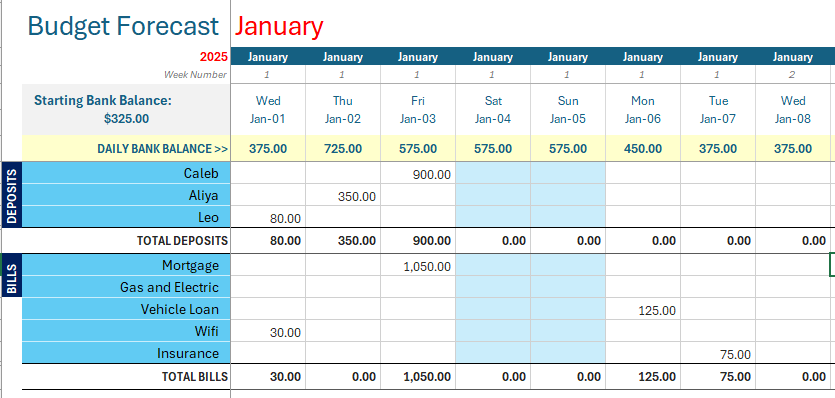- Home
- Bookkeeping Articles
- Small Business Bookkeeping
Bookkeeping for Small Business
by Ken Boyd
If you’re just starting out as a small business, you will quickly learn that part of your role means wearing many different hats.
One of the most integral parts of running your business, however, is staying on top of your finances.
Here we will briefly discuss the basics to get you started with bookkeeping for small business.

Click above button to get our most popular Excel Template for easy bookkeeping! It's free.
1. Separate Your Finances
As a small business owner, you may be a lone wolf, but that doesn’t mean you should start mixing your business and personal expenses.
If you do, things can get messy very quickly.
Set up a separate business banking account so all your business income and outgoings are in one place.
2. You Can Never Know Too Much
You may think that bookkeeping for small business and accounting are the same, and, well they are similar, however, there are a number of differences that you need to keep in mind to ensure success.
First and foremost, your bookkeeping is simply the measuring and recording of all those transactions that are happening within your accounts.
The accounting process summarizes and analyzes these transactions which can then help you out when making business decisions.
Small business accounting requires a lot of analytical skill and can be quite complex, whilst recording the numbers and making sure everything matches requires less critical thinking.
Once accountants reach a certain level of experience, they can take an exam to become a CPA.
If you’re interested, here's everything you'll need to become a qualified CPA.
It’s worth noting that most accountants oversee the bookkeepers work to ensure accuracy and adherence to best practices. Therefore, regardless of the knowledge you have, it’s always best to seek out some expert advice, even if it’s just initially, from a fully qualified CPA to help you with your bookkeeping for small business.
3. Reconcile Frequently
Reconciliation is an integral part of bookkeeping for small business.
Ideally, you want to be doing small reconciliations on a weekly basis and at the VERY minimum on a quarterly basis.
You need to ensure that any discrepancies are resolved there and then, whether it is 1 cent or 100 bucks, you want your end of year financial statement to be accurate and if what’s showing in your books doesn’t match what’s in the bank there’s going to be an issue.
Weekly reconciliation is quick and makes it easier to pinpoint discrepancies if there are any.
Additionally, if you need to make an important business decision for the company, being on top of your finances is essential as you need to know whether or not what you’re taking on is financially viable.
4. Go Digital
There’s a wealth of information out there to help you pick the best accounting software for your small business, but it’s safe to say, no matter what you do, something that’s cloud-based can make your life easier.
Most cloud-based platforms allow you to sync your business bank account with their software so that your books are updated automatically. This means you can upgrade from old school spreadsheets and reconcile your accounts with fewer discrepancies.
An added bonus of the cloud is that everything is also backed up in case your laptop decides to give up on you one day.
Another way you can go digital is with time tracking software for your employees.
There’s an abundance of cloud-based trackers out there where employees can simply clock their hours from their smartphone, computer or tablet.
The software can also calculate their vacation time, sick pay, overtime and will sync with your other cloud-based products to make payroll a breeze.
5. Plan Ahead When it comes to taxes
It’s easy to become overwhelmed when the word ‘taxes’ is mentioned, especially with all the dates you have to remember..
Not paying your taxes on time can result in hefty fines.
Thankfully, the IRS put together a useful tax calendar which will help you stay on top of dates for returns etc.
When it comes to planning ahead, we recommend putting away a percentage of your earnings each month so that you’re not stung with a bill you’re unable to afford come tax time.
6. Stay on top of Accounts Receivable
It may seem obvious, but cash is king and you could see your cash flow dry up fairly quickly if you don’t keep an eye on those unpaid invoices.
Always reach out to any clients who are late in paying, even if it’s just a couple of days.
Most of the time they will have just forgotten, but if they’re having cash flow issues, at least you may be able to arrange some kind of payment plan to get something back.
7. Outsource if you need to
Remember, you don’t have to be an expert in everything.
If you’re unsure about any part of the bookkeeping process - outsource.
Find the right small business bookkeeper, who has meticulous attention to detail, almost to the point where they annoy you.
Ensure they’ve got in-depth knowledge, specifically to your industry is a bonus, and, most of all, make sure they’re reliable and organized.
Ken Boyd is a former Certified Public Accountant (CPA) and the author of several of the popular "For Dummies" books published by John Wiley & Sons including 'CPA Exam for Dummies' and 'Cost Accounting for Dummies'.






Facebook Comments
Leave me a comment in the box below.